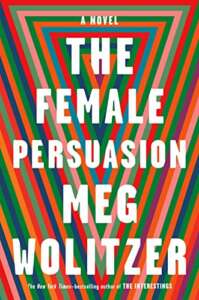 Discussion questions for The Female Persuasion by Meg Wolitzer
Discussion questions for The Female Persuasion by Meg Wolitzer
- Blurbs for the book say that, “[a]t its heart, The Female Persuasion is about the flame we all believe is flickering inside of us, waiting to be seen and fanned by the right person at the right time.” Do you agree that that’s what this book is “about”? What else could you say this book is “about”?
- Did you see Faith and Greer’s falling out coming? Do you think it was inevitable? Why or why not?
- Did you find it realistic that Greer so surprised that her parents hadn’t done the financial aid forms properly? Was that specific failing on their part meant to be anything more than a plot device?
- What did you think about the cover?
- NPR’s reviewer says that Wolitzer “speaks to very particular intergenerational resentments: that younger women are whiny, entitled and don’t know that they have it easier because of what older women suffered; that older women are clueless, racist, passé, embarrassing to the cause of the young. The Female Persuasion unpicks these tensions but doesn’t indulge them, preferring to show feminism as an ecosystem rather than an arrow.” Do you agree? Does Wolitzer’s approach fit with your own view of how past and present feminism co-exist.
- The Guardian‘s reviewer refers to women’s struggles over the vote, birth control, sexual liberation, and more, saying that “these might have been a series of battles won, rather than the war promised.” Does the novel “press[] knowingly against these bruises” with [t]he sense that we may have smashed a glass ceiling, but now are standing in the shards, discreetly bleeding” as the reviewer suggests?
- The New Yorker‘s reveiwer argues that “[t]here is an obvious, odd omission here. Though Wolitzer extends her novel into 2019, acknowledging the Trump era, too cutely, as ‘the big terribleness,’ nowhere does she mention the woman whom Trump ran against. Faith, who has traded her youthful activism for corporate pragmatism and establishment bona fides, has more than a dash of Hillary in her, and maybe Wolitzer felt that a dash sufficed. It is nonetheless awkward for this realist novel about women and power to trim reality in a way that neatly excises the woman who has served as our national lightning rod for conversations, good, bad, and ugly, about women in power during exactly the period that it purports to examine.” What do you think about Hillary’s absence from the book? How would the book have been different if she had been included, even peripherally?
- The New Yorker‘s reviewer also feels that “[t]he events of the past few months [early 2018], and the fierce discussions about feminism that they have engendered, have proved to be far more electrifying and complex than anything that Wolitzer depicts here. Surpassed by the present that it aims to depict, the novel feels amiable and mild by comparison, already quaintly out of date.” Do you agree? Looking back at 2018 and 2019 do feel the same way about this book as the reviewer did at the time?
- Similarly, The Huffington Post‘s reviewer says: “The novel seems to have been written for a more slickly packaged feminist era than this one ― for a Hillary Clinton presidency, or at least for a past world in which such a presidency felt like a sparkling inevitability rather than a tattered, flawed impossibility.” Do you agree that the world has changed so much since Wolitzer wrote the book that the lens through which she saw isn’t one we can access any more? Why or why not?
- The Huffington Post‘s reviewer goes on to say: “The problem is not that people like Greer shouldn’t become activists, or shouldn’t feel proud of their work, or should wallow in guilt over their privilege. It’s that a novel sifting through the small failures (and huge successes) of a prominent young white feminist hardly feels like a major statement about the movement. In 2018, aren’t there more vital, surprising and layered stories to tell? Aren’t there faces of the female, and feminist, experience calling more urgently for depiction in popular culture? Perhaps Wolitzer, who is remarkably gifted at portraying creative, educated young white women coming of age, isn’t the writer to tell those other stories ― but if not, it remains troubling that she and her publisher have presented this very conventional, very limited image of feminism as a universal story.” Do you agree? If there are other, more diverse stories to tell, does that make this book any less worth reading?
- The Huffington Post‘s reviewer also argues: “As a portrait of torch-passing between two generations of feminism, Wolitzer’s novel elides, for the most part, questions about how feminism has changed and how it could in the future. It’s a cycle, not a forward movement; women start out young and feisty, then grow jaded and comfortable. Greer, despite her rift with Faith, doesn’t represent much of a step forward for the feminist movement ― she’s just at an earlier point in her career.” Do you see Greer already changing her views as she ages? Do you think she’ll change as much as she thinks Faith has changed?
- Time‘s reviewer also had a take on how the female characters in the book relate to each other and the feminist movement: “Wolitzer … is less interested in scoring points than in presenting engaging characters. In that realm, the novel is sporadically successful. The moral of her story is that women owe it to each other, and to the world, to be their best selves. Now there’s a feminist message we can all find persuasive, if far from revolutionary.” Do you think that’s the moral that Wolitzer was aiming for? If not, what do you think her moral is?
For more questions, check out the LitLovers resources.

